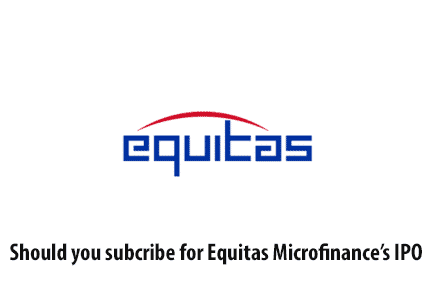CRISIL has upgraded its rating on Equitas Micro Finance India Pvt Ltd’s (Equitas’s) long-term debt instruments to‘BBB-/Stable’ from ’BB+/Stable’. The upgrade reflects CRISIL’s belief that Equitas’s operations, profitability, and capitalization will not be adversely affected if the Malegam committee recommendations are implemented in their current form, given the company’s ability to comply with the majority of the operational and financial recommendations of the report. Equitas’s capitalization and profitability are also better shielded from the impact of loan provisioning recommendations than that of microfinance institutions (MFIs) with significant exposure to Andhra Pradesh (AP).
The upgrade also reflects Equitas’s comfortable liquidity and adequate funding profile; the company can draw down from its existing sanctioned lines, though with heightened disclosures and scrutiny by the banks. The company also has the flexibility to reduce its disbursements to manage its debt repayments and other obligations. The upgrade has also factored in Equitas’s management’s stated policy of maintaining at least Rs.1.0 billion as unencumbered cash and investments until the funding scenario for the industry revives.
The rating reflects Equitas’s adequate capitalization and extensive industry experience of its board and senior management. These rating strengths are offset by Equitas’s relatively unseasoned loan book and regional concentration, exposure to increased regulatory and legislative risks associated with the MFI sector and constrained funding environment across the MFI sector.
Equitas’s capitalization has improved in the past two years on the back of improving internal accruals and regular capital infusions. As of January 31, 2011, the net worth of the company was Rs.3.01 billion, against Rs.2.72 billion as of March 31, 2010. The current capitalization is sufficient to meet the projected growth requirements of the company in the medium term. However, the additional capital infusion will be required to achieve its revised growth targets in the microcredit business and for its proposed housing and vehicle finance businesses. CRISIL believes that the initial contribution to Equitas’s new businesses will not exceed Rs.750.00 million for the medium term. Any additional equity is likely to come from external investors. Equitas also derives significant benefits from experienced professionals from the financial services sector on its board of directors and top management. Robust processes and systems implemented by the management have enabled the company to significantly scale up operations within two years since the commencement of operations.
Equitas’s asset book, however, remains unseasoned. As on December 31, 2010, its portfolio at risk (PAR) of greater than 30 days, 60 days, and 90 days on a six-month lagged basis were 1.59 percent, 0.17 percent, and 0.15 percent respectively, compared with 0.23 percent, 0.09 percent, and 0.05 percent as on March 31, 2010. The increase in delinquency has been primarily on account of gradual seasoning of the portfolio and stress in the AP portfolio. The companies have a low exposure of around Rs.241.4 million (2.7 percent of the total portfolio as on January 31, 2011) to AP, for which it is likely to fully provide for by the end of 2010-11 (refers to financial year, April 1 to March 31). Furthermore, Equitas’s operations are primarily confined to Tamil Nadu (72.3 percent of loans outstanding as on January 31, 2011). CRISIL believes that though Equitas will increase its geographical diversity over the medium term—its share of the portfolio in Tamil Nadu is expected to be around 60 percent in the medium term. The ability of the company to manage its asset quality will remain a rating sensitivity factor.
The promulgation of an ordinance on MFIs by the Government of AP has demonstrated the vulnerability of MFIs to regulatory and legislative risks. Equitas continues to rely on funding primarily from banks and financial institutions. Since the implementation of the AP ordinance, the flow of funding to the MFI sector from the banking system has been severely constrained. The instances of MFIs operating outside AP, including Equitas, being able to raise additional funding from banks and other sources have been selective and at much lower levels than before the implementation of the AP ordinance.
CRISIL believes that although Equitas’ growth and profitability will be considerably lower than previously projected, the company will remain well-positioned to gain access to bank financing to support its revised business plans. Furthermore, the funding position for the MFI sector, especially for the ones operating outside AP, is expected to improve after notification by the Reserve Bank of India of the recommendations of the Malegam committee report.





